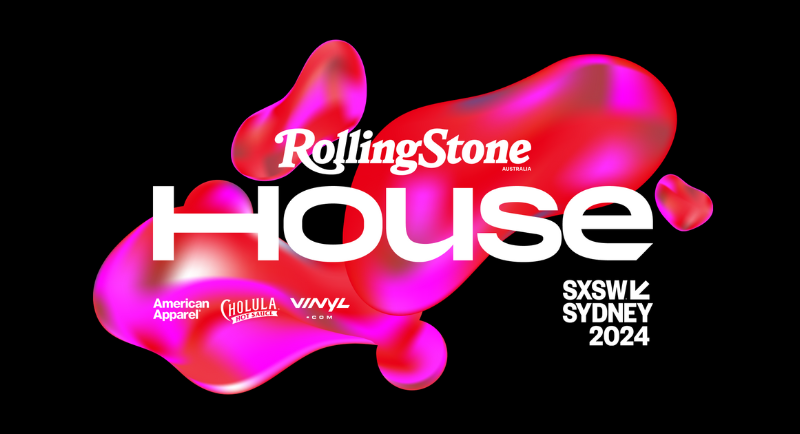By James Manning, Alisha Buaya and Jasper Baumann at SXSW
SXSW Sydney day five rounds out a long and tiring week that was fun, insightful, and inspiring. Mediaweek was on the ground – here’s what happened on Friday, October 18.
Brilliant marketing or Dark Art: Are you convincing or conning your customers?
WARC managing editor Rica Facundo moderated a lively and interactive panel between Hardhat founder, Dan Monheit, and Sarla Fernando, ADMA’s regulatory expert, on the fine line between the behavioural economics of marketing and “conning” your customers into a purchase. The trio examined common practices and debated whether they’re great marketing or potentially problematic cons, and teach the audience how to avoid landing on the wrong side of the law.
Fernando spoke about dark patterns, noting that it shares “the common notion that you’re manipulating consumers into making choices that they might otherwise not have made.
“The definition of effective marketing is persuading consumers to purchase something they may not have intended. So what’s the difference between using a really cute little puppy dog to make me purchase something or taking me down a game where I’m playing this game and I’m seeing a really big green button and every time I press it I get free coins or a free avatar or I go up a level or I get. then I keep going down this journey and about the fifth time I press that green button I’m asked to purchase something.
“What’s the difference between that because at the end of the day, dark patterns, they exist everywhere, right? Why is this a problem today? Why do governments care about this now? Well, effectively, the increased extent to which data about an individual can be gathered, put together with the rise of digital marketing, means that it accelerates an advertiser’s ability to create personalised ads that use their speeches to specifically appeal, emotionally or psychologically, to its intended target.” – AB
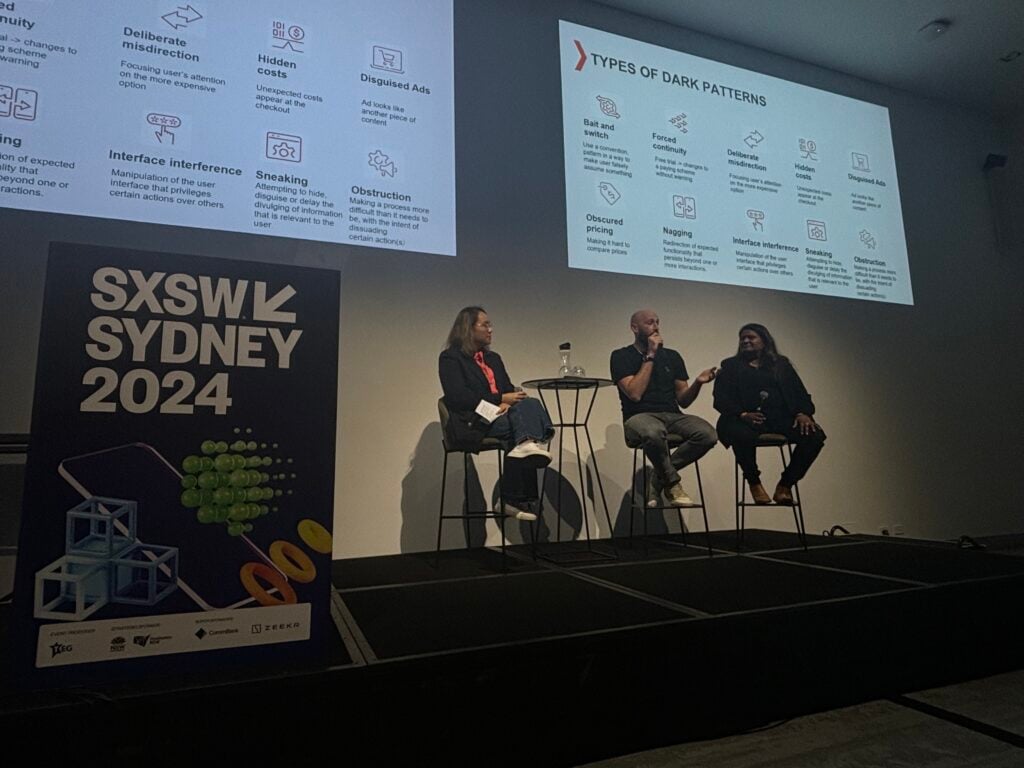
Rica Facundo, Dan Monheit and Sarla Fernando.
The Reputation Tightrope
Natasha Brack, director of communications at SNAP, APAC, academic and social commentator, Dr. Susan Carland, and comedian and writer, Sami Shah, discussed how organisations and individuals manage their reputation whilst taking a stand on social issues in an interconnected and divergent world.
Dr Carland pointed out that people get deeply trapped in their own silos of beliefs and opinions “to the point where we actually can’t conceive of how someone could think differently to us. Because we’re not all sharing a newscape anymore, a shared set of facts.
“What that happens then, when we’re talking about, as you said, dehumanisation is the only way we can understand that someone could think differently to us on anything, whatever it is, is that they must be either evil or stupid.
“They’re the only conclusions we can draw and when we think that about other people, well then I don’t need to engage with them. It’s much easier to dehumanise them, destroy them online.”
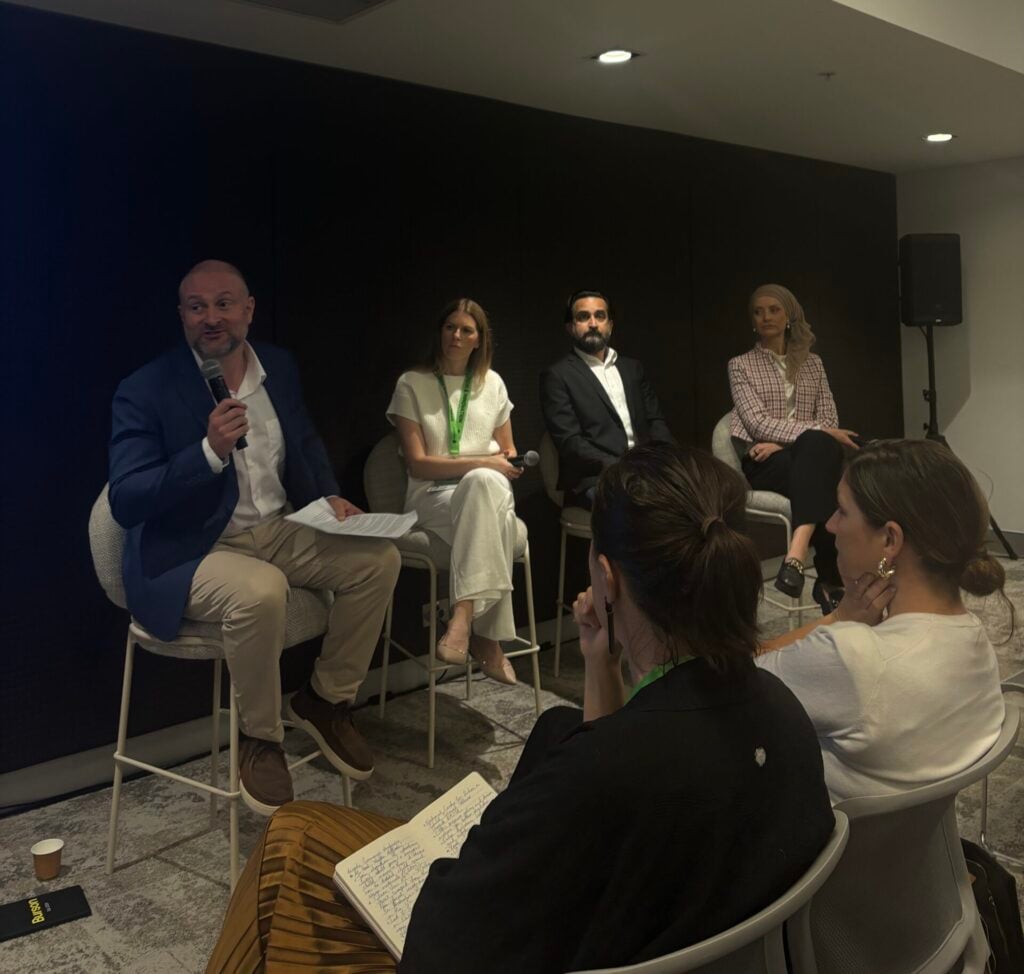
Natasha Brack, Sami Shah and Dr. Susan Carland
From a comedian’s point of view, comedian Shah said that making jokes is not necessarily the best way to discuss important and topical issue in society.
“I think we’ve somehow degraded experts to the point where for some reason, and again social media has a large part to play in this, comedians have become thought leaders.
“You go online and these young boys are watching stand-up comedians like Joe Rogan or whoever, but going, ‘oh he has wisdom’. No, he doesn’t. His loyalty is to the punch line. That has always been true, and most comedians, I know most comedians, we’re degenerates. We’re poorly read, ill-informed.
“We just spend all day thinking, ‘what’s the word that will get me that laugh?’ That’s our only loyalty. So the idea that comedians are giving the truth and the insight, that’s Ricky Gervais blowing up his own butt. It has nothing to do with what actually comedians’ role in society is.
“We (comedians) are the clown. Our job is to say the emperor has no clothes, but we will always be the clown pointing that out, and the emperor will always remain the emperor. Don’t think you can then supplant the emperor.” – AB
Rolling Stone House
Rolling Stone House rounded out its three day take over of UTS Underground in Ultimo for SXSW Sydney 2024 with an impressive line up of performers including Hockey Dad, The Grogans, Full Flower Moon Band, and a DJ set by Teen Jesus and the Jean Teasers.
Guests were greeted with a fun Cholula Hot Sauce walkway and treated to an American Apparel activation with a free printed T-Shirt and a silent disco that allowed guests to put on headphones and dance to hits by Charli XCX, Beastie Boys and Beyonce (thank you).
The Rolling Stone, Brag Media and Vinyl Group teams pulled out all the stops on Friday night with a line up that included Emmanuel Kelly, Phoebe Rings, daste, Dayshawn and Heartbreak High’s Ayesha Madon. – AB
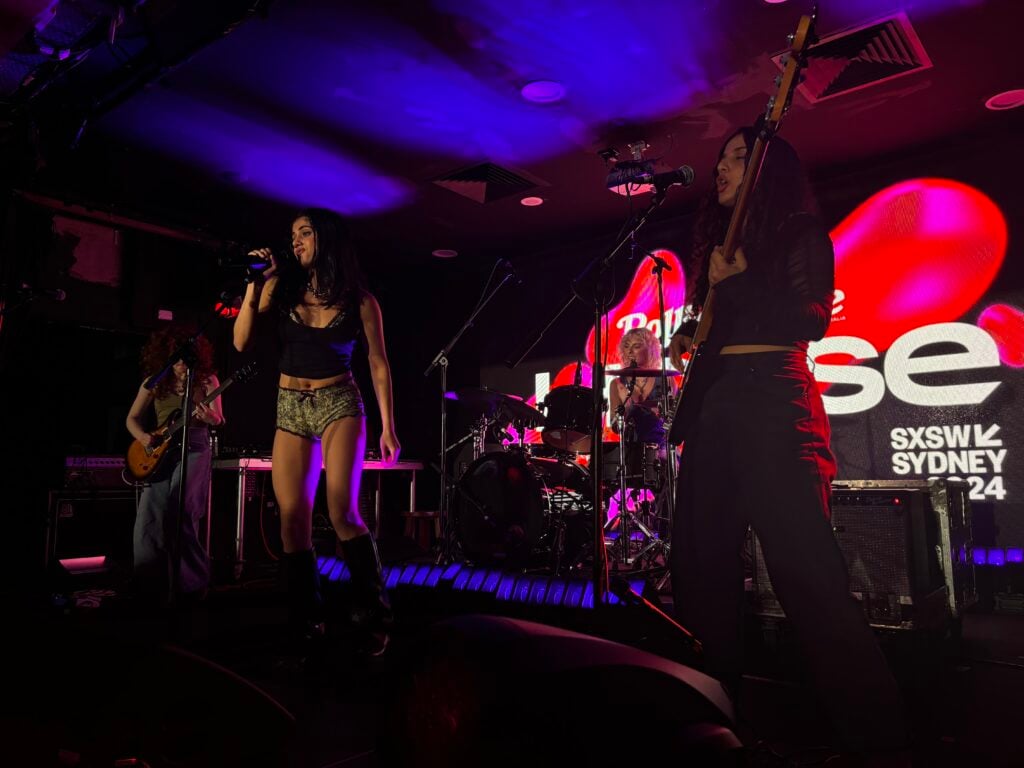
Ayesha Madon
The Ideas Dome: Massive impact of News.com.au’s About Bloody Time campaign
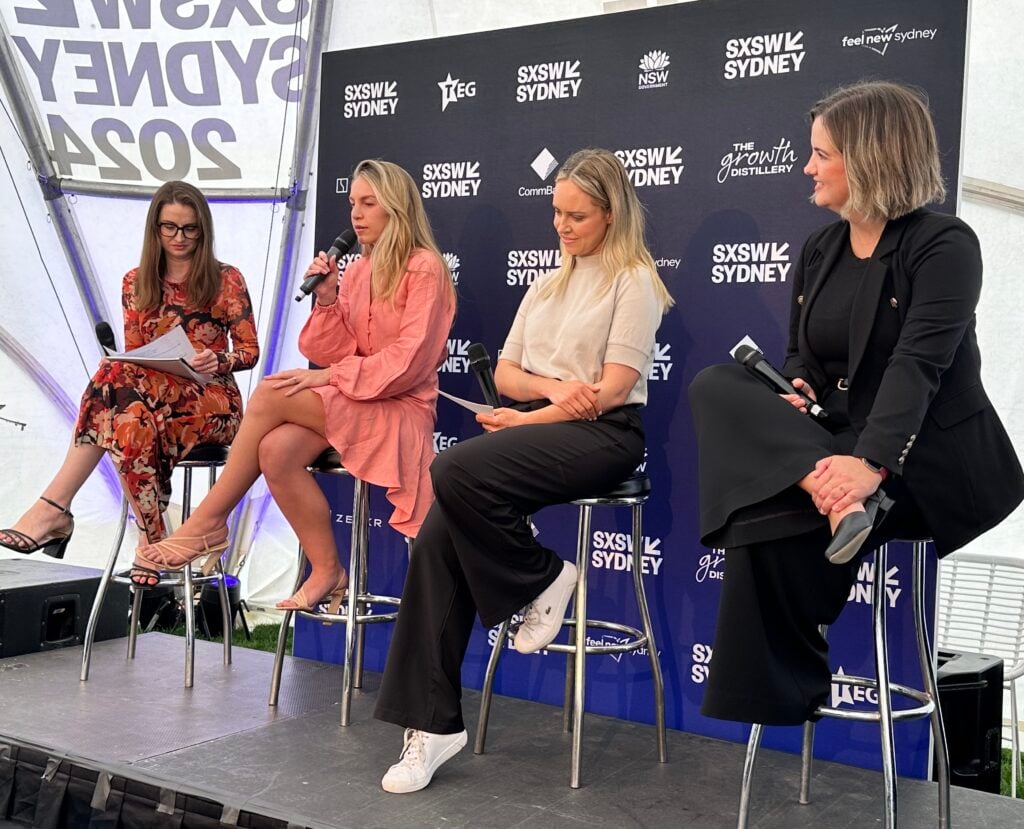
Liz Burke, Lexi Cartwright, Julie Snook and Kerry Warren
A Friday panel discussion in The Growth Distillery’s The Ideas Dome delved into News.com.au’s impactful “About Bloody Time” campaign.
The editorial initiative was dedicated to addressing the significant issue of endometriosis and the inadequate healthcare support women with this condition face in Australia. The campaign brought attention to the silent suffering of many and has become a beacon of change in the way endometriosis is treated and discussed within the medical community and society at large.
The session was hosted by Liz Burke, deputy editor of News.com.au. She was joined on The Ideas Dome stage by News.com.au journalists and editors Lexi Cartwright, Julie Snook, and Kerry Warren. Snook is also an Endometriosis Australia ambassador. JM
Are brands the new cultural super force?
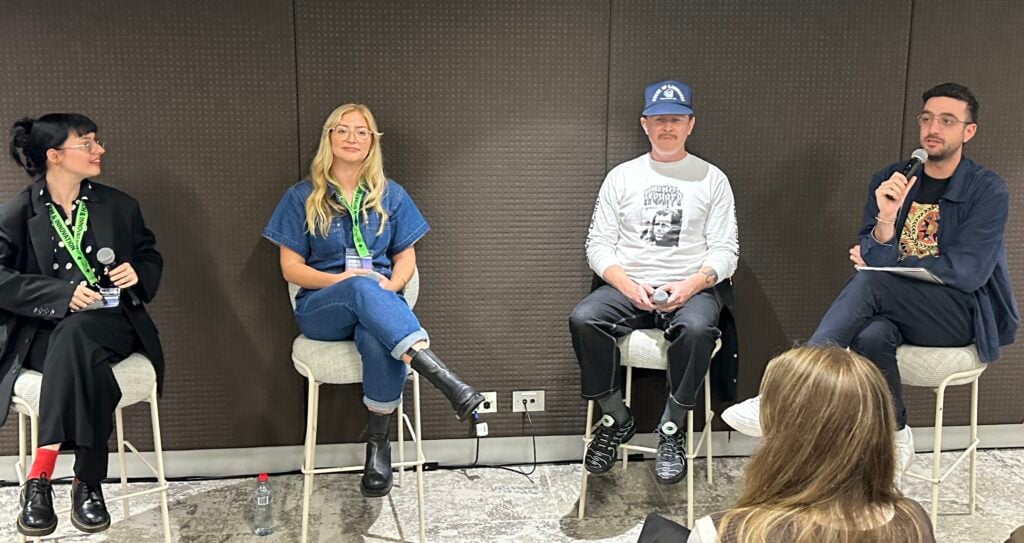
Tully Walter, Elly Strang, Tim Snape and Sam Koslowski
The co-founder of the podcast The Daily Aus, Sam Koslowski, hosted a Friday afternoon session about brands and their influence on culture.
Joining Koslowski on the SXSW stage were Elly Strang from Tracksuit, Tim Snape from Heaps Normal and Tully Walter from SOON Futures.
The session was to examine the importance of brand power, particularly among young Australians, in shaping the journalistic narrative. The discussion navigated the complexities surrounding how brands must evolve to maintain and grow their influence amidst changing consumer expectations and the vital role of branding power in cementing trust in journalism.
Brands as cultural super forces
Koslowski noted the transformative role brands play as emerging cultural super forces, gradually replacing traditional societal influencers such as religion and pop culture. This shift signifies a paradigm change in consumer behaviour, wherein individuals now exhibit strong brand attachment, altering conventional cultural dynamics. The conversation extends to how brands are not merely products but cultural storytellers capable of reshaping societal narratives and values, matching the rhythm of evolving consumer mindsets.
Heaps Normal’s branding journey
Tim Snape chronicled the journey of Heaps Normal, detailing how the brand aimed to become synonymous with non-alcoholic beer. By understanding cultural trends and aligning their strategy and timing, Heaps Normal successfully positioned itself as a significant cultural influencer. Snape explained the challenges and strategic decisions that played a pivotal role in carving out a niche in the market, making Heaps Normal a leader in advocating for moderation and redefining drinking culture in Australia.
The panel concluded that a keen understanding of evolving cultural shifts is imperative for effective brand strategy. Brands must not only adapt but also create an aspirational identity that resonates with societal trends, such as the growing sober culture and heightened awareness around mental wellbeing.
The essence of successful branding lies in the balance of adapting to these societal trends while fostering a strong, trustworthy brand identity that resonates with individuals on a deeper, cultural level. JM
Building next-gen progressive media companies
Alicia Vrajlal, Crystal Andrews, Lucy Blakiston and Natasha Gillezeau discussed the challenges and opportunities of building new-generation progressive media companies on their panel.
They emphasised the importance of bravery and challenging industry norms, the role of algorithms in shaping content consumption, and the need for financial sustainability. Metrics discussed included news fatigue at 41% and a gender gap in Gen Z’s interest in news, with only 23% of women very interested compared to 47% of men.
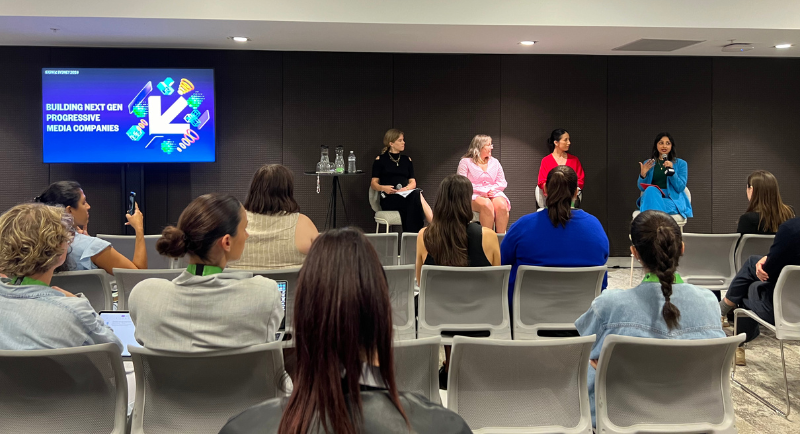
The panellists also discussed the importance of quality over quantity, the difficulty of monetising progressive media, and the need to break taboos, particularly around women’s issues and mental health.
According to the panel, next-gen media companies can diversify their revenue streams beyond advertising and brand partnerships by exploring subscription models and paid content offerings, such as newsletters, podcasts, or exclusive content for paying members. They also suggested to investigate opportunities for innovation grants, funding programs, or other forms of institutional support that align with the company’s mission and values. – JB
For News Media, Digital Transformation Isn’t a Process – It’s a State
Chris Janz was joined by Duncan Greive, Lee Lowndes and Lucy Blakiston on a panel discussing the challenges smaller media companies face in a market-dominated major media companies and big tech.
In a fragmented digital landscape, the panellists explored key strategies to engage audiences and build brand value, including:
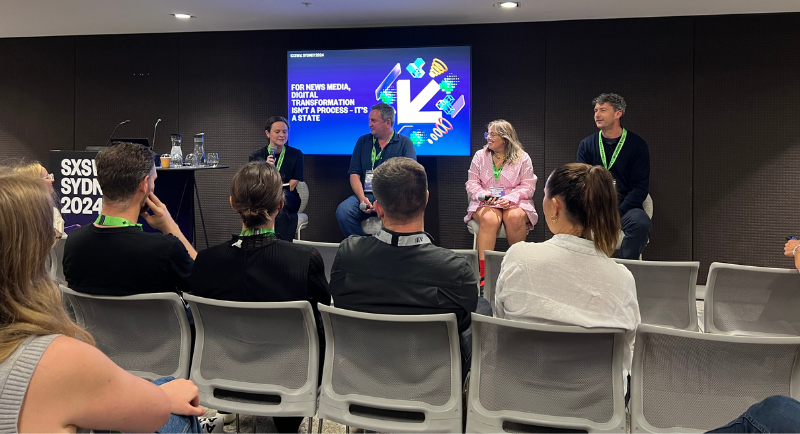
• Owning the audience relationship through direct channels like newsletters and subscriptions, rather than relying on social media platforms.
• Focusing on creating unique, valuable content that adds real journalistic value, rather than just replicating commodity news.
• Building a distinct brand identity and voice, often centered around individual journalists, to foster a direct connection with readers.
• Experimenting with new content formats like podcasts and short-form videos to engage audiences across different platforms. – JB

